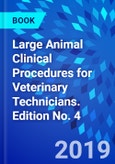- The most comprehensive large animal book specifically written for veterinary technician students. - A practical approach makes this text useful in classes and in clinical situations, so veterinary technicians, acting under instructions of veterinarians, can plan and follow through on procedures and treatment regimens for large animals. - A focus on the veterinary technician's responsibilities explains why and how a procedure is performed, and the roles that vet techs fill in preparing for, assisting in, and following up the procedure. - Coverage of the essential large animal-related tasks in the CVTEA Manual of Accreditation for Veterinary Technology Programs addresses AVMA accreditation and prepares you to pass the Veterinary Technology National Exam. - Full-color photographs and line drawings show step-by-step procedures in areas such as restraint, bandaging, physical examination techniques, and diagnostic procedures. - Coverage of husbandry and breeds demonstrates how day-to-day housing and feeding affect the care of many large animal diseases, and helps you learn to provide quality client education. - A section on the livestock industry provides comprehensive coverage of safety and handling, reproduction, and nutrition, so you can better understand the practices, procedures, and decisions in large animal veterinary medicine. - A section on llamas and alpacas helps you to understand the health and maintenance of these increasingly popular domestic animals - in the U.S., there are more than 12,000 alpaca herds and 25,000 llama owners. - Proper medical terminology is included in a comprehensive glossary, facilitating effective communication with clients and with other professionals. - Learning features enhance your critical thinking and decision making with case studies, clinical applications, key terms, chapter outlines, learning objectives, and Technician Notes. - NEW! Tables on Temperature, Pulse, Respiration (TPR) data and vaccine schedules provide a quick, at-a-glance reference for important information. - NEW! Expanded regulatory information for livestock provides details on OCV vaccination, Health Certificate forms, Brucellosis and Tuberculosis testing, and Scrapies tags. - NEW! Four new chapters on Poultry provide detailed coverage of the breed.
Table of Contents
Part 1: The Livestock Industry 1. The Importance of Livestock 2. Livestock Safety and Handling 3. Livestock Reproduction 4. Livestock Nutrition�
Part 2: Large Animal Hospital Management 5. Daily Hospital Responsibilities 6. Admissions, Medical Records, and Physical Examinations 7. Diagnostic Imaging for Large Animals
Part 3: Horses in Veterinary Practice 8. Equine Husbandry 9. Equine Clinical Procedures 10. Equine Surgical Procedures 11. Common Equine Disease
Part 4: Cattle in Veterinary Practice 12. Bovine Husbandry������ 13. Bovine Clinical Procedures 14. Bovine Surgical Procedures 15. Common Bovine Diseases���
Part 5: Sheep and Goats in Veterinary Practice 16. Ovine and Caprine Husbandry 17. Ovine and Caprine Clinical Procedures 18. Ovine and Caprine Surgical Procedures 19. Common Ovine and Caprine Diseases
Part 6: Llamas and Alpacas in Veterinary Practice 20. Camelid Husbandry 21. Camelid Clinical Procedures 22. Camelid Surgical Procedures 23. Common Camelid Diseases
Part 7: Swine in Veterinary Practice 24. Porcine Husbandry 25. Porcine Clinical Procedures 26. Porcine Surgical Procedures 27. Common Porcine Diseases
Part 8: Poultry in Veterinary Practice 28. Poultry Husbandry 29. Poultry Clinical Procedures 30. Poultry Surgical Procedures 31. Common Poultry Diseases
Glossary








